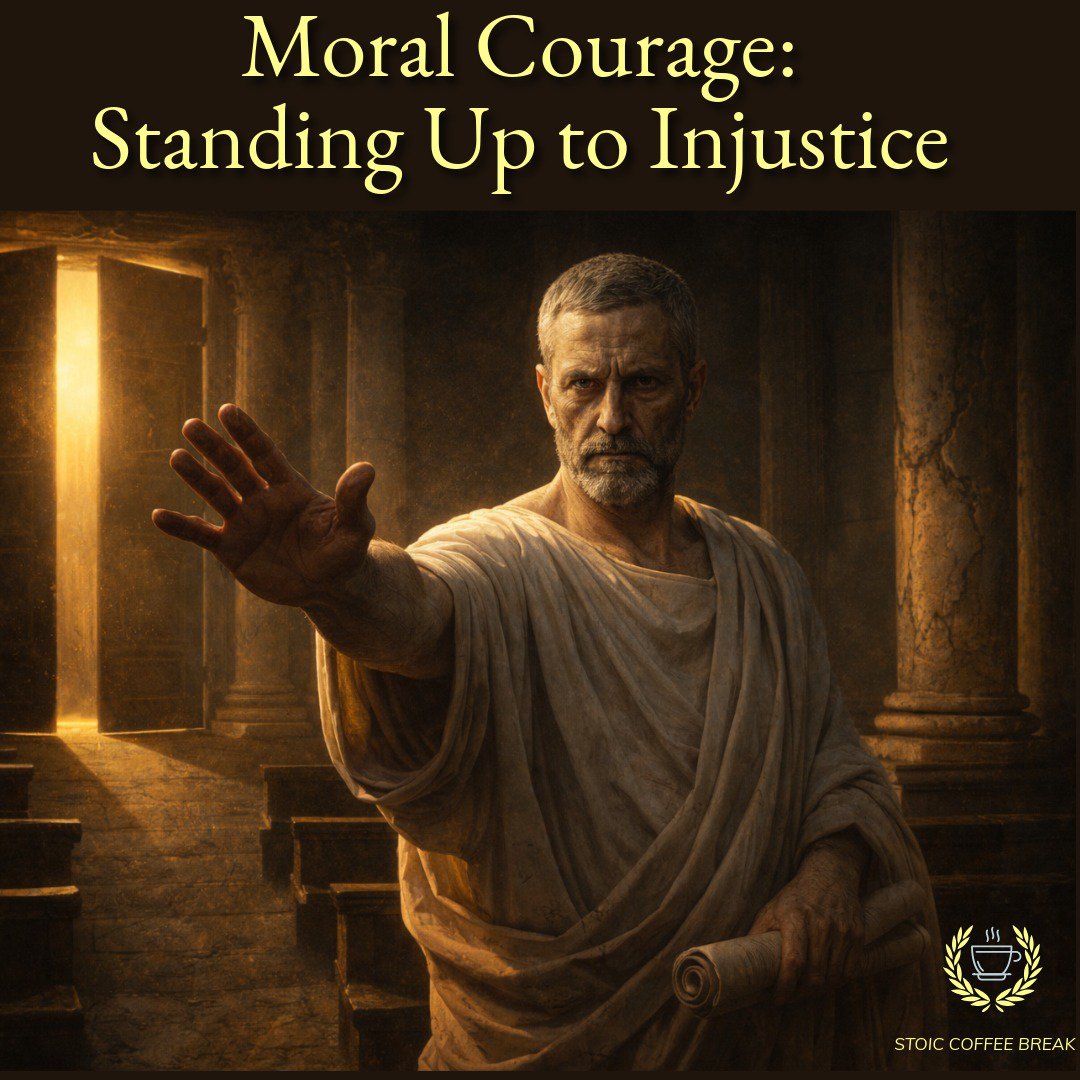
Are you worried about finances? Do you struggle when you have a political conversation with somebody and it becomes heated? Do you worry about failing at life? Well, these are three questions that I'm going to answer today in another Q & A episode.
Hello friends. My name is Erick Cloward and welcome to the Stoic Coffee Break. The Stoic Coffee Break is a weekly podcast where I take aspects of Stoicism and And do my best to break them down to their most important points. I share my thoughts on Stoic philosophy and modern wisdom and share my experiences, both my successes and my failures, and hope that you can learn something from them all within the space of a coffee break.
So, like I said, this week's episode is a Q and A episode. From time to time, I like to take questions from my listeners and answer them and do my best to talk about how the Stoics would view some of the issues that we're dealing with in modern times. And share some of my experiences on and thoughts on that as well.
So the first question is, How can stoicism help me manage financial stress? Well, first thing to think about is When it comes to financial stress, oftentimes it's because we don't feel like we have enough money to buy the things that we need to. But oftentimes we need to take a step back and think about the things that we do spend our money on.
So Epictetus said:
“Wealth consists not in having great possessions but in having few wants.”
Because external things are things that are outside of our control, wealth, health, and happiness are not necessarily good or bad. They're just simply external things that we need to deal with in life. And the first thing I want you to think about is what are you spending your money on?
Are you spending it on things that are needed? Are you spending it on things that are excessive? Or do you have a car that's, that's far beyond your, your budget? So for me, one of the things that happened, about 20 years ago, after I got divorced was that I was in a situation where the company I was working for was a startup and they were having some financial trouble and they ended up bouncing five of my paychecks in a row, meaning they'd pay me, it would be in my bank, I would spend against that money and then there would be insufficient funds from their bank, and I would end up having bouncing checks on my side to the people that I paid. And this started to cause a lot of stress because obviously I was worried about if I'd have enough money to pay my bills and pay my rent and, you know, if the company was having that much trouble, would I even have a job?
And so, I had this moment of panic, where it really almost terrified me. And, this was long before I found stoicism, but I ended up doing “premeditatio malorum”, meaning the premeditation of evils. I sat down and I thought about what would happen if I lost my job and I wasn't able to find another job for a while.
So, I was living in a small basement apartment that was relatively inexpensive. So, taking care of my rent would have been something that I could have done. Um, I had a car that was, didn't have a high car payment, so I'd probably be able to afford that. If I wasn't able to afford my apartment, I thought, well, I guess I could live in my car.
I had a gym membership that was super cheap at the time. It was only four dollars a month. It still is only four dollars a month because of a special deal I got. And so I would have a place to shower and, you know, I could also reach out to some of my relatives and see if I could borrow some money for the short term until I got it back on my feet.
But in doing so and thinking about what I would do in the worst case scenario, it really helped to kind of take some of those, that fear that was there and that panic and kind of tamp it down. Because I realized that no matter what happened, I'd figure out a way to survive. It might not be comfortable, and it might not be fun, but I would be able to survive.
So, along with that Not that you need to be a minimalist, but there's a great quote from Will Rogers that I really like, which I want you to keep in mind. And it says:
“Too many people spend money they haven't earned to buy things they don't want to impress people they don't like.”
With your spending habits, are you buying things just to impress other people? Are you buying the newest, fanciest clothing or gadgets or whatever it is that you think is important in your life? Is it really that important? And could you do with something that was much more frugal? Something that didn't cost nearly as much? By being aware of the things that you spend your money on and where your priorities are, then you can start to look back over everything that you have and see if it's really worth keeping or spending that money on.
Because oftentimes we buy things because we want to show off to others. And in doing so, we feel like we have to have these particular things in order to feel good about ourselves. But those external things that we get aren't the things that make us who we are. They aren't the most important things. The important things are who you are inside.
And that's why the Stoics focus so much on living a life of virtue as the only thing What they call the soul good, it's the only thing that brings true happiness in your life. If you're acting wisely, if you are being courageous, if you are practicing justice, meaning how you treat other people and are you treating them well, as well as practicing discipline in your life. And if you can practice those things in your life, then no matter what your external circumstances are, you'll be able to feel at least okay and be able to deal with those situations in your life.
Question number two: How can I remain calm and composed during heated political or social debates? This one's a tough one, but I think it's an important one.
Right now, all throughout the world, especially in the United States, we're seeing massive amounts of political division. And the sad part of this is that in order to govern a country, we need to be able to talk to each other. We need to be able to make compromises. We need to be able to work together to solve the problems that we're facing.
And the more that we're divided, the less progress we make because we're spending too much time trying to knock down the other person rather than working together to solve the big problems that are in our society. Things like global warming, things like problems in our economy, things like inequality and homelessness.
These are big problems that are happening and all we're doing is we're fighting over made up things that politicians have put out there to divide us, to get us on their side. So when you're dealing in conversations like this, one of the most important things is that you try to understand Why somebody feels the way they do?
Why do they hold that particular political belief? Because it goes back to my favorite quote by John Stuart Mill, which is, which says:
“He who knows only his side of the case knows little of that. His reasons may be good, and no one may be, have been able to refute them. But if he is equally unable to refute the reasons on the opposite side, if he does not so much as know what they are, he has no ground for preferring either opinion.”
Meaning, if you don't understand what their reasons are for voting the way that they do, or holding political ideas that they do, Then you don't even understand the whole argument. You're just standing up for your side and trying to defend it. By understanding the other side, you get a holistic picture, or at least a more holistic picture, of why they believe what they do.
And then you can actually start to have a conversation about those things. And that's what democracy is. It's a conversation, it's not just about elections. So that's an idea that Yuval Noah Harari talks about in his book, Nexus. And I really like that idea that democracy is just a conversation. We need to be able to talk to each other.
If we only see the other side as the enemy, then we're not going to be able to solve a lot of these difficult issues. So first and foremost, even if it's challenging, even if it's hard, even if you disagree with their opinions and their ideas. And the very first step to making that communication is to start to understand why they hold the opinions that they do.
All right. Last question: How do I deal with feeling like I'm not good enough or that I'm failing in life?
This can be incredibly challenging. And I think the most important thing to remember is that when you fail in doing something and that you haven't succeeded, if it's something that's external to you, Meaning, say you tried a business venture and it didn't work out because of external things.
Those are often times things that are outside of your control. So, considering yourself a failure because of something external, it doesn't have anything to do with your value. Your external status, your external position in life, your successes in life and those types of things don't reflect what kind of person you are.
And this is something that the Stoics were very clear on, is that in order to be a good person and to succeed in life, the things that you need to practice are all internal. So are you practicing virtue, which includes wisdom, courage, justice, meaning how you treat other people, and temperance, meaning are you disciplined in your life and are you trying to apply those other things.
How kind are you to other people? How much compassion do you have for others? Those are the things that really truly matter in life. So if you fail at something external, or because of something external, That doesn't reflect on whether you're a good person or not. Now, if this is something that you failed at, that you feel like is an attribute that you have, and it is something internal, then the first thing and foremost is that you learn to accept yourself for exactly who you are, even all of your shortcomings and your failures.
And there's a great quote that I want to bring up here by Carl Rogers, and he says:
”The curious paradox is that when I accept myself just as I am, then I can change.”
Until you accept yourself for exactly who you are, warts and all, even all the things you don't like about yourself. Which, for me, is probably one of the most important lessons that I've learned over the last few years.
And in episode 218, I talk about that, it's about self acceptance, and there's a great exercise in there. So if you haven't listened to that episode, I really recommend that one. And it's all about learning to accept everything about yourself, especially the things you don't like. The other thing is, is that you've got to remember that failures are things that are simply a part of life.
And this is why the Stoics were so big on talking about How you face challenges and be resilient. And again, this brings up one of my favorite quotes from Marcus Aurelius. The impediment to action advances action. What stands in the way becomes the way. Meaning that the failures that you have, the challenges, the obstacles that are there, those are the things that help you gain strength.
You know, again, using the tired cliche about going to the gym and just Only lifting weights that are easy, it's not going to make you stronger. It's not going to develop muscle. And you have to take on the hard things in order to get good at those hard things. It's like Henry Ford said, failure is simply the opportunity to begin again, this time more intelligently.
And more than anything, I want you to remember that when you face obstacles, they aren't problems. They're simply opportunities for choices. So when you come up to something and it feels like it's stopping you from doing what you want to do, Just remember, it's an opportunity for you to make choices about what you want to do.
And think about what those choices are, and then start taking action on those things. And that's the end of this week's Stoic Coffee Break. As always, be kind to yourself, be kind to others, and thanks for listening. Also, if you have any questions that you would like me to answer on the podcast, please leave them in the comments, if it's on your podcasting app, or down in the comments below if you're watching this on YouTube.
And I also wanted to let you know that my book, Stoicism 101, is now available for pre order on Amazon. I've left a link in the show notes and also in the description of the video below, and I would really appreciate it if you could support me and buy my book. So I put a lot of work into this thing, and I think if you like my podcast, you're going to really like this book too.
Thanks again for listening.
My book Stoicism 101 is available for pre-order! Order here!
Find out more at https://stoic.coffee
Watch episodes on YouTube!
Find me on linkedIn, instagram, twitter, or threads.
Thanks again for listening!


